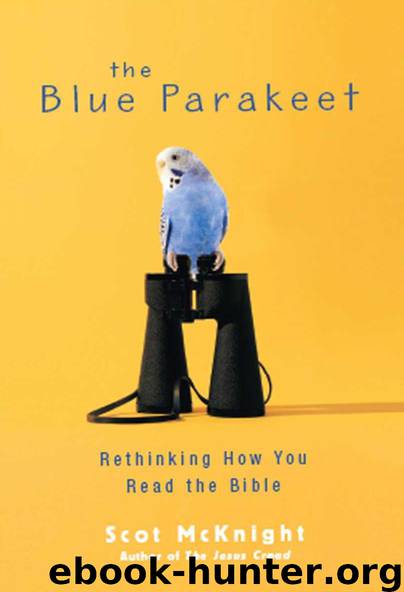The Blue Parakeet - Rethinking How You Read The Bible by Scot McKnight

Author:Scot McKnight
Language: eng
Format: mobi, epub
Published: 2012-01-03T16:45:26+00:00
When you pray, say . . .
Whenever you pray, recite this. . .
Here is a fact from church history: to the best of our knowledge, the followers of Jesus have always recited the Lord’s Prayer whenever they have gathered for worship and prayer. The evidence for this is universal — every major denomination in the world prior to the nineteenth and twentieth centuries recited the Lord’s Prayer every Sunday. Why? Because Luke 11:2 taught them to do this. But most evangelical churches I have worshiped in and preached in do not recite the Lord’s Prayer whenever they pray together. We have “applied” the words of Luke 11:2 differently, so differently that our translations reflect our own nonrecital of the Lord’s Prayer. Why? Because there is an unwritten, contrary-to-what-Jesus-taught principle at work among us that reciting set prayers leads to vain repetitions.
I have no desire here to engage that debate. What needs to be realized is that this practice of not reciting the Lord’s Prayer whenever we gather together is contrary to what Jesus said (and what the church has always done); rather, it is our application of what Jesus said.
We have chosen, for pastoral reasons, not to do what Jesus commanded us to do and have chosen instead to apply these words in another way. How? We take them as a general principle instead of a specific commandment, and this permits us to gather together in prayer without reciting the Lord’s Prayer. This decision permits us to see the Lord’s Prayer as a “model” prayer instead of a recited prayer. (For what it’s worth, I think the Lord’s Prayer is both a model and the precise words we should use whenever we gather in prayer. I recite it several times a day.)
Let’s be honest: we treat this commandment of Jesus the way we treat most of the commands in Leviticus 19; that is, we ignore it or dismiss it.
Jesus, Conversion, and Today
As a second example, here is what Jesus requires or expects of those who want to enter the kingdom of heaven, all from the gospel of Matthew.
They must have surpassing righteousness (Matthew 5:20).
They must do God’s will (7:21).
They must become as a child in humility (18:3).
They must cut themselves off from whatever is in the way (18:8 — 9).
They must abandon riches (19:23 — 24).
They must separate from the scribes and Pharisees (23:13).
How do we “apply” these so-called entrance requirements of Jesus? To anticipate, we mostly don’t apply them. We have discerned what they meant and how to make use of them in our world.
For many Christians these statements by Jesus sound far too much like “works righteousness.” That is, we prefer a similar kind of saying in John 3:3: “No one can see the kingdom of God without being born again.” How is one “born again”? Many answer that from the same chapter, verse 15: “that everyone who believes may have eternal life in him.”
But here’s a question to think about: What would the gospel look like —
Download
The Blue Parakeet - Rethinking How You Read The Bible by Scot McKnight.epub
This site does not store any files on its server. We only index and link to content provided by other sites. Please contact the content providers to delete copyright contents if any and email us, we'll remove relevant links or contents immediately.
| Exegesis & Hermeneutics | New Testament |
| Old Testament |
The Five People You Meet in Heaven by Mitch Albom(3561)
The Secret Power of Speaking God's Word by Joyce Meyer(3180)
Real Sex by Lauren F. Winner(3014)
Name Book, The: Over 10,000 Names--Their Meanings, Origins, and Spiritual Significance by Astoria Dorothy(2978)
The Holy Spirit by Billy Graham(2944)
0041152001443424520 .pdf by Unknown(2843)
How The Mind Works by Steven Pinker(2813)
ESV Study Bible by Crossway(2773)
Ancient Worlds by Michael Scott(2682)
Churchill by Paul Johnson(2578)
The Meaning of the Library by unknow(2565)
The ESV Study Bible by Crossway Bibles(2550)
The Gnostic Gospels by Pagels Elaine(2527)
MOSES THE EGYPTIAN by Jan Assmann(2411)
Jesus by Paul Johnson(2352)
City of Stairs by Robert Jackson Bennett(2347)
The Complete Dead Sea Scrolls in English (7th Edition) (Penguin Classics) by Geza Vermes(2277)
The Nativity by Geza Vermes(2226)
Ancient Near Eastern Thought and the Old Testament by John H. Walton(2223)
